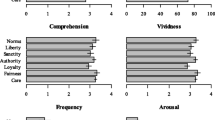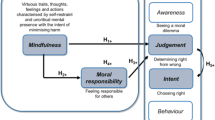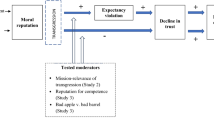Abstract
Morality and rationality are both normative: the moral claim “you ought to help others” is a genuine normative judgment, as well as the rational maxim “you ought to brush your teeth twice a day”. But it seems that there is a crucial difference these two judgments. In the first part of this paper, I argue that this difference is to be understood as a difference between two kinds of normativity: demanding and recommending normativity. But the crucial task is, of course, to explain the difference. In the second part of this paper, I suggest that metaethical expressivists can provide a good explanation: by extending the analysis of ordinary (non-normative) demands and recommendations to normative judgments, they can formulate a convincing account that captures the key differences between morality and rationality.
Similar content being viewed by others
Notes
One restriction should be mentioned right at the beginning: In the following, I will focus solely on deontic judgments, i.e., roughly, on judgments about what people ought to do (in the rational or the moral sense). How evaluative judgments fit into my framework is an interesting question, but a thorough discussion of this issue is beyond the scope of the present paper. Let me just mention one possibility here: if evaluative judgments can be reduced to deontic judgments, as e.g. Smith (2005) has argued (drawing on a proposal by Sidgwick), the integration of evaluative judgments into my framework is completely straightforward. Even if this reduction fails, however, another way of integrating evaluative judgments may be found.
Strictly speaking, we have to distinguish here between two kinds of rationality in the broad sense: rationality relative to the facts (objective rationality), and rationality relative to the agent’s beliefs (subjective rationality). I sidestep this issue most of the time by restricting my attention to scenarios where the relevant beliefs of the agents are all true, i.e. to scenarios where objective and subjective rationality coincide.
It is quite clear that Kant himself would not endorse this extension. For him, moral principles are principles of rationality—or, more precisely, categorical principles of rationality (“categorical imperatives”), as opposed to principles of prudence and instrumental rationality, which are merely hypothetical (“hypothetical imperatives”); cf. Kant (1985/1911), p. 414 ff. There are several problems with this view, but this is not the place to discuss them.
Of course, it is in principle possible to interpret Pasteur’s remark in a moral sense. If he had said, e.g., “you really ought to heat food that you want to preserve—just think of your children!”, a moral interpretation would suggest itself. In that case, it would be appropriate to say that Pasteur demanded that food should be heated. But I assume here that Pasteur made it clear that his remark should be understood as a judgment of rationality, not as a moral verdict. Under these circumstances, it seems indeed incorrect to characterize Pasteur’s remark as a demand.
It should be emphasized at this point that ordinary demands and recommendations are not mere abbreviations of normative judgments with demanding and recommending force. In the case of ordinary demands and moral judgments, this is quite clear: a kidnapper can demand money from the parents of his victim without pretending that they have the moral obligation to give him the money. In the case of ordinary recommendations and judgments of rationality, the difference is less obvious, but I contend that it still exists. Consider e.g. a subject who is unsure how to evaluate a certain scenario. She has an idea about what she would do in such a case, but because of the complexity of the matter, she refrains from making a judgment concerning the rationality of the hypothetical options for action. It seems, however, that this subject can still make a guarded recommendation that is sincere.
Furthermore, I am in agreement with Pink when he describes the difference between moral obligations and rational requirements as a difference in normative force, i.e. as the difference between “the force of Demand” and “the force of Recommendation” (Pink 2004, p. 170).
Another author who emphasizes this difference is Harry Frankfurt (Frankfurt 2004, p. 47, especially Fn 6).
Of course, when we react in the ways described above, we presuppose that the agent is morally responsible: if we learn that the agent lacked relevant pieces of information or did not possess the required sort of control over her actions, the reactions are inhibited. (This holds for both cases of norm violation.)
Could it be that the difference between moral judgments and judgments of rationality is just a difference in strength, i.e. that the reasons cited in moral judgments are merely weightier than (but of the same general kind as) the reasons cited in judgments of rationality? I don’t think so. Consider these two statements: “it is (prima facie) morally wrong to make people uncomfortable” and “it is (prima facie) irrational to ruin your health by chain-smoking”. These statements seem to be true, but intuitively, the reason cited in the first statement is rather weak, while the reason cited in the second statement is very strong. Note further (a) that no additions of prudential reasons (“chain smoking also makes you less attractive, impairs your intelligence, etc.”) would transform the judgment of rationality into a moral judgment, and (b) that there are no intermediate cases between judgments of rationality and moral judgments (as we would expect, if the relevant difference were a difference in strength).
Of course, if we count indirect speech acts, imperatives can also be used to perform speech acts that are not directive. This, however, is not relevant for our purposes here.
To be sure, there are some problem cases. Consider the following scenario: a judge demands that the defendant should pay her parking tickets, but does not care whether she does so or not. Should we really say that the judge’s demand is insincere? Or take, for example, a lieutenant who orders his soldiers to shoot a deserter (i.e. who makes an authority-based demand that his soldiers shoot the deserter), while secretly hoping that they will refuse to follow his order. Even in that scenario, it is not clear that we can speak of an insincere speech act. I think that these cases are special in the following respect: they involve speakers who play a distinctive role in a social institution, and who speak on behalf of that institution—not on behalf of themselves. This explains why they do not have to satisfy the standard sincerity condition in order to count as speaking sincerely. (I thank an anonymous referee for bringing these cases to my attention.)
Cf. Searle & Vanderveken (1985, p. 203). It should be noted, though, that the view of Searle and Vanderveken is more complicated—and arguably also more problematic—than the SSAT position I describe here. Searle and Vanderveken hold that the sincerity conditions for recommendations also include desires, since they defend the thesis that “[all] directive illocutionary forces have the general sincerity condition that the speaker wants or desires the hearer to do what he attempts to get him to do.” (Searle and Vanderveken 1985, p. 56) This, however, is an implausible stance to take, for the reason given above.
Hypothetical decisions or conditional intentions do not, of course, settle once and for all what we will (or would) do in certain circumstances. Instead, like all (prior) intentions, they are open to reconsideration. We can revise conditional intentions or abandon them altogether in the light of new arguments or new information. Cf. Bratman (1987), chapter 5, for a careful discussion of these issues.
What is the precise meaning of “in all relevant respects” here? Which facts have to be ‘held constant’ between the situation of the person P that I evaluate and the hypothetical situation that I imagine myself to be in? This depends, to some extent, on the context. If I am talking about what would be the most reasonable thing to do for P given the circumstances she is in—i.e. if I am making a judgment of objective rationality—, the erroneous beliefs of P are not held constant, but instead changed to fit the facts. If, on the other hand, I am talking about what would be the most reasonable thing to do for P given her beliefs about the circumstances—i.e. if I am making a judgment of subjective rationality—, all factual beliefs of P are held constant (including the false ones).
Gibbard (2003, p. 52) discusses this issue and comes up with a plausible answer: planning for remote possibilities, according to Gibbard, is a “rehearsal for life”. Just like a chess player can learn from games that were played long ago, even if she will never be in exactly the same situation as the players in these games, we can learn from ‘playing out’ possible scenarios in our head that will never become actual. Another reason might be that our ability to plan for ‘being in someone else’s shoes’ enables us to predict the behavior of other agents, as proponents of the simulation theory, e.g. Goldman (2006), have claimed.
This characterization fits well with Hamblin’s (1987) distinction between “wilful” and “non-wilful” imperatives: “COMMANDS, DEMANDS and REQUESTS […] could be called wilful imperatives. By contrast, a second category, consisting mainly of ADVICE, INSTRUCTIONS (in one sense) and RECIPES, is non-wilful and is concerned not with the interests and wishes of the utterer but with those of the addressee.” (Hamblin 1987, p. 10)
I follow Gibbard (1990) in using “normative avowals” as a theory-neutral term which denotes the speech acts performed by uttering normative sentences in ordinary contexts.
Cf. Searle & Vanderveken (1985, p. 18): “[S]uccessful performances of illocutionary acts necessarily involve the expression of the psychological state specified by the sincerity conditions of that type of act.”
Of course, some expressivists—like Gibbard (1990, p. 84ff) in the passage just cited—also try to provide a further analysis of the expression relation, i.e. a theoretical account that spells out how the mental state expressed by an act (viz. the sincerity condition of that act) is determined. For my purposes, though, it is only important that all expressivists accept (E).
This conception of the relation between plans and intentions is already present in Bratman (1987), who writes: “Intentions are, so to speak, the building blocks of […] plans; and plans are intentions writ large” (p. 8).
Cf. Gibbard (1990), p. 7: “The rational act is what it makes sense to do, the right choice on the occasion. A rational feeling is an apt feeling, a warranted feeling, a way it makes sense to feel about something.”
The controversial second premise is, of course, a version of rationalism. I discuss the question of rationalism at length in Section 4.
This case and the following are similar to examples used by Sturgeon (1985), p. 23f, in his objections to Gibbard’s account. I have changed them in several respects to make the objections more forceful.
Note that, ex hypotesi, the crazy philosopher is still using “rational” in the broad sense. She just argues that feeling guilt and resentment is rational (in the broad sense), because we have strong prudential reasons to feel that way (and, presumably, no strong reasons not to feel that way). As I have mentioned above, this reasoning is valid—though in that case surely not sound.
Gibbard (1985), p. 35, replies to this (type of) objection by distinguishing between judging it rational to feel a particular emotion and judging it rational to want to feel that emotion. He would say that the crazy philosopher should be described as holding the view that wanting to feel and resentment is rational, but not as holding the view that the feelings themselves are rational (cf. also Gibbard (1990), p. 37ff). This, however, is a strange reply. According to the crazy philosopher, feelings of guilt and resentment have positive effects on us. This is a reason to want to have these feelings—but it is also a reason to have these feelings. As an analogy, consider our attitudes towards actions. Say, e.g., that exercising has positive effects on us. This is a reason to want to exercise, but it is also a reason to exercise!
One might think here of Friedrich Nietzsche, who holds a similar view.
This might be the view of a utilitarian who thinks that feeling resentment has generally bad effects (on oneself and on other people).
A critic might object that it is part of the meaning of “morality” that it applies only to system of norms that deal with guilt and resentment. Although I am very doubtful of that claim, I could concede it and go on to argue that the unorthodox philosophers can still make judgments with demanding normative force. Whether these judgments deserve to be called “moral judgments” is a secondary issue.
Blackburn’s (1998) view on these matters is not entirely clear. The most extensive discussion of rationality in his book concerns the principle of maximizing expected utility (cf. chapter 6), but in this case, Blackburn explicitly disputes the normative nature of the principle in question.
This formulation raises the issue of judgment internalism, i.e. the question whether moral attitudes are intrinsically motivating or not. While the internalist thesis is obviously controversial, I am confident that some version of it can be defended. Maybe the straightforward internalism stated here must be rejected; but in that case, we can replace it with an appropriately qualified reformulation, which is still sufficient for my purposes.
On the other hand, what is required by NEA for your judgment of rationality to count as genuine is that you would want to save money for the future if you were in the situation of any other person. And this requirement seems quite plausible.
E.g., Gibbard’s (1990) account (on a natural interpretation).
This talk of “commitment” has to be spelled out, of course, but I cannot do it here. Consider, instead, the following analogy: When John says “Everything that the Pope says is true”, he is not, strictly speaking, expressing all the beliefs that correspond to Pope’s statements—he may not even know most of the Pope’s statements. What he is expressing is rather a commitment to all these beliefs—which means, for example, that he can be criticized for being inconsistent when he believes things that are logically incompatible with statements that the Pope has made.
Or is it? One possible criticism of her stance is the following: how can she plan to help the stranger in Carl’s situation while knowing that she would probably ignore the cry for help if she were like Carl in all relevant respects? However, this criticism can be answered by distinguishing between predictions for hypothetical situations and contingency planning for these situations, or—as Luca Ferrero (2009), p. 702, puts it—between the external reading of “I will φ in C” (= “I predict that, if C, I will undertake the intention to φ simpliciter”) and the internal reading of that statement (= “I hereby undertake the intention: φ if C”). It is quite clear, I think, that these two things can come apart: Rachel might agree that it is statistically more likely that she would choose to ignore the call in such that situation, while holding on to her hypothetical plan to help the stranger instead.
Indeed, an expressivist might even argue—in the spirit of R.M. Hare—that universalizability is the ‘ingredient X’ that distinguishes moral judgments and other normative pro-attitudes form ordinary wants, intentions and desires.
I thank an anonymous referee for drawing my attention to this implication of NEA.
For such a form of rationalism, cf. e.g. Smith (1994), p. 184.
References
Blackburn S (1998) Ruling passions. Clarendon, Oxford
Bratman M (1987) Intentions, plans, and practical reason. Harvard University Press, Cambridge
Ferrero L (2009) Conditional intentions. Nous 43:700–741
Frankfurt H (2004) The reasons of love. Princeton University Press, Princeton
Gibbard A (1985) Reply to Sturgeon. Ethics 96:34–41
Gibbard A (1990) Wise choices, apt Feelings. Clarendon, Oxford
Gibbard A (2003) Thinking how to live. Harvard University Press, Cambridge
Gibbard A (2009) Reconciling our aims. Oxford University Press, Oxford
Goldman A (2006) Simulating minds: the philosophy, psychology, and neuroscience of mindreading. Oxford University Press, Oxford
Hamblin CL (1987) Imperatives. Blackwell, Oxford
Kant I (1785/1911) Grundlegung zur Metaphysik der Sitten (Groundwork for the Metaphysics of Morals). In Kants gesammelte Schriften, Vol. 4, ed. Königlich-Preußische Akademie der Wissenschaften. Georg Reimer, Berlin
Kant I (1788/1913) Kritik der Praktischen Vernunft (Critique of Practical Reason). In Kants gesammelte Schriften, Vol. 5, ed. Königlich-Preußische Akademie der Wissenschaften. Georg Reimer, Berlin
Kolodny N (2005) Why be rational? Mind 114:509–563
Parfit D (1997) Reasons and motivation. Proceedings of the Aristotelian Society (Suppl) 71:99–130
Pink T (2004) Moral obligation. In: O’Hear A (ed) Modern moral philosophy. Cambridge University Press, Cambrige, pp 159–185
Searle JR, Vanderveken D (1985) Foundations of illocutionary logic. Cambridge University Press, Cambridge
Smith M (1994) The moral problem. Blackwell, Malden
Smith M (2005) Meta-ethics. In: Jackson F, Smith M (eds) The Oxford handbook of contemporary philosophy. Oxford University Press, Oxford, pp 3–30
Sturgeon N (1985) Gibbard on moral judgment and norms. Ethics 96:22–33
Acknowledgements
I would like to thank Vuko Andric, Christian Nimtz, Marc Staudacher, an anonymous referee for this journal and the participants of the Graduate Philosophy Conference on Normativity 2008 in Amsterdam for helpful comments, valuable suggestions and stimulating discussions.
Author information
Authors and Affiliations
Corresponding author
Rights and permissions
About this article
Cite this article
Schulte, P. The Difference Between Moral and Rational “Oughts”: An Expressivist Account. Ethic Theory Moral Prac 15, 159–174 (2012). https://doi.org/10.1007/s10677-011-9276-9
Accepted:
Published:
Issue Date:
DOI: https://doi.org/10.1007/s10677-011-9276-9




